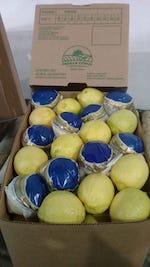The Argentinian lemon season has officially started. Alejandro Moralejo, who is the CEO of Salix Fruits, says: “We started loading for Russia, Ukraine and Canada at the beginning of March, and will being loading for the US in April, and for Europe in the beginning of May. The season will run through mid-August.”
Good weather brings good quality and volume
The harvest started on time this year, though there were some inconveniences and delays caused by the mandatory quarantine which was imposed as a precaution to prevent the spread of COVID-19. “This caused some delays in the end-of-March cargoes,” Moralejo shares. Besides these challenges, Salix Fruit’s lemon season is off to a good start thanks to great weather during the growing season: “The spring and summer were dry, which is good for the lemons and this benefitted the quality of the fruit. During the last weeks of the summer we had some rains that allowed the growth of the fruit to achieve optimal sizing. We are seeing very good quality and excellent sizing this season,” says Moralejo.

Alejandro Moralejo, CEO of Salix Fruits.
New app to increase efficiency
Salix Fruits has worked to consciously prepare this season so that they can produce increasingly efficient services to the producers and customers. “We have focused on three aspects: the market, the production, and the operational efficiency. With an eye on the market, we have incorporated two new resources to be closer to our customers in the US and in the Middle East, and we have expanded the supermarket base in the US for the placement of fruit from all origins. For the production side of things, we have started working with new producers from Peru, Egypt and South Africa in order to have a complete and varied offer,” Moralejo says.
He adds: “We have also launched an app that our clients and producers will be able to download directly to their phones. We have already launched the Beta version and it was very well received! Version 1.0 should be available to download within the next few weeks. With this app, customers can keep track of all the offers we have, along with images of the fruits detailing their origin and price. The customers will be able to do a particular search for what they need and once they place their order, they can track it. In the case of suppliers, it allows us to communicate their offers to a database of more than 10,000 of our clients worldwide.”
US market is growing Argentina exports their lemons mainly to Europe and Russia. “About 75% of the volume goes there,” says Moralejo. In 2018, the US market reopened for Argentinian lemons after having been closed for more than 18 years. “Since the US market has reopened, the Argentinian lemons have been gaining ground. The North American consumer is recognizing the products from Argentina. For Argentina in general, the US market receives about 10-15% of the volumes. For us, the US, Russia and Canada are our main destinations for our lemons, and we are one of the main importers of the Argentinian lemon into the US,” Moralejo says.
Argentina exports their lemons mainly to Europe and Russia. “About 75% of the volume goes there,” says Moralejo. In 2018, the US market reopened for Argentinian lemons after having been closed for more than 18 years. “Since the US market has reopened, the Argentinian lemons have been gaining ground. The North American consumer is recognizing the products from Argentina. For Argentina in general, the US market receives about 10-15% of the volumes. For us, the US, Russia and Canada are our main destinations for our lemons, and we are one of the main importers of the Argentinian lemon into the US,” Moralejo says.
This season, Argentina is expecting to export around 300,000 tons of lemons. “This comes out to about 20 million boxes of 18 kg. For our company, we expect to market around 700,000 boxes,” Moralejo shares.
Argentina is seeing a slight container shortage, but Salix Fruits has taken steps to ensure that their exports won’t be interrupted. Moralejo says: “Logistics is a natural part of the export process from the southern hemisphere. This year, the shortage of containers will be complemented by the service of chartered vessels, which make two trips every two weeks into Northern Europe, Russia and the Mediterranean.”
“The world is in turmoil. Mandatory quarantines, difficulties in the ports and internal logistics are some of the challenges we have to overcome. For, now, protocols are being carried out on packaging and harvests to guarantee the health of the workers in the fruit sector,” Moralejo concludes.
 For more information:
For more information:
Salix Fruits
Email: goodnews@salixfruits.com
www.salixfruits.com
